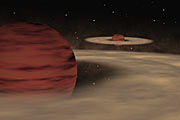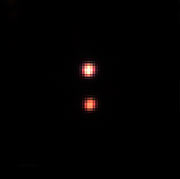Press Release
The 'Planemo' Twins
Astronomers Discover Double Planetary Mass Object
4 August 2006
The cast of exoplanets has an extraordinary new member. Using ESO's telescopes, astronomers have discovered an approximately seven-Jupiter-mass companion to an object that is itself only twice as hefty. Both objects have masses similar to those of extra-solar giant planets, but they are not in orbit around a star - instead they appear to circle each other. The existence of such a double system puts strong constraints on formation theories of free-floating planetary mass objects.
Ray Jayawardhana of the University of Toronto (Canada) and Valentin D. Ivanov of ESO report the discovery in the August 3 issue of Science Express, the rapid online publication service of the journal Science.
"This is a truly remarkable pair of twins - each having only about one percent the mass of our Sun," said Jayawardhana. "Its mere existence is a surprise, and its origin and fate a bit of a mystery."
Roughly half of all Sun-like stars come in pairs. So do about a sixth of brown dwarfs, 'failed stars' that have less than 75 Jupiter masses and are unable to sustain nuclear fusion in their cores. During the past five years, astronomers have identified a few dozen of even smaller free-floating planetary mass objects, or planemos, in nearby star forming regions. Oph 162225-240515, or Oph1622 for short, is the first planemo found to be a double.
The researchers discovered the companion candidate in an optical image taken with ESO's 3.5-m New Technology Telescope at La Silla, Chile. They decided to take optical spectra and infrared images of the pair with ESO's 8.2-m Very Large Telescope to make sure that it is a true companion, instead of a foreground or background star that happens to be in the same line of sight. These follow up observations indeed confirmed that both objects are young, at the same distance, and much too cool to be stars. This suggests the two are physically associated.
By comparing to widely used theoretical models, Jayawardhana and Ivanov estimate that the companion is about seven times the mass of Jupiter, while the more massive object comes in at about 14 times Jupiter's mass. The newborn pair, barely a million years old, is separated by about six times the distance between the Sun and Pluto, and is located in the Ophiuchus star-forming region approximately 400 light years away.
Planets are thought to form out of discs of gas and dust that surround stars, brown dwarfs, and even some free-floating planetary mass objects (see ESO Press Release eso0619). But, "it is likely that these planemo twins formed together out of a contracting gas cloud that fragmented, like a miniature stellar binary," said Jayawardhana. "We are resisting the temptation to call it a 'double planet' because this pair probably didn't form the way that planets in our Solar system did," added Ivanov.
Oph1622B is only the second or third directly imaged planetary mass companion to be confirmed spectroscopically (see ESO Press Release eso0428 [1]), and the first one around a primary that is itself a planetary mass object. What's more, its existence poses a challenge to a popular theoretical scenario, which suggests that brown dwarfs and free-floating planetary mass objects are embryos ejected from multiple proto-star systems. Since the two objects in Oph1622 are so far apart, and only weakly bound to each other by gravity, they would not have survived such a chaotic birth.
"Recent discoveries have revealed an amazing diversity of worlds out there. Still, the Oph1622 pair stands out as one of the most intriguing, if not peculiar," said Jayawardhana.
"Now we're curious to find out whether such pairs are common or rare. The answer could shed light on how free-floating planetary-mass objects form," added Ivanov.
Notes
[1]: Another serious candidate is the low-mass companion to GQ Lupi, a young T-Tauri star. Models lead to a mass for this object between 1 and 42 Jupiter masses.
Contacts
Ray Jayawardhana
University of Toronto
Toronto, Canada
Tel: +1 416-946-7291
Cell: 647-233-7749
Email: rayjay@astro.utoronto.ca
Valentin D. Ivanov
ESO
Chile
Tel: +56 2 464 4562 or +56 2 463 3252
Email: vivanov@eso.org
About the Release
| Release No.: | eso0629 |
| Legacy ID: | PR 29/06 |
| Name: | Oph 1622 |
| Type: | Milky Way : Star : Type : Brown Dwarf Milky Way : Star : Grouping : Binary |
| Facility: | New Technology Telescope, Very Large Telescope |
| Instruments: | FORS2, ISAAC |
| Science data: | 2006Sci...313.1279J |
Our use of Cookies
We use cookies that are essential for accessing our websites and using our services. We also use cookies to analyse, measure and improve our websites’ performance, to enable content sharing via social media and to display media content hosted on third-party platforms.
ESO Cookies Policy
The European Organisation for Astronomical Research in the Southern Hemisphere (ESO) is the pre-eminent intergovernmental science and technology organisation in astronomy. It carries out an ambitious programme focused on the design, construction and operation of powerful ground-based observing facilities for astronomy.
This Cookies Policy is intended to provide clarity by outlining the cookies used on the ESO public websites, their functions, the options you have for controlling them, and the ways you can contact us for additional details.
What are cookies?
Cookies are small pieces of data stored on your device by websites you visit. They serve various purposes, such as remembering login credentials and preferences and enhance your browsing experience.
Categories of cookies we use
Essential cookies (always active): These cookies are strictly necessary for the proper functioning of our website. Without these cookies, the website cannot operate correctly, and certain services, such as logging in or accessing secure areas, may not be available; because they are essential for the website’s operation, they cannot be disabled.
Functional Cookies: These cookies enhance your browsing experience by enabling additional features and personalization, such as remembering your preferences and settings. While not strictly necessary for the website to function, they improve usability and convenience; these cookies are only placed if you provide your consent.
Analytics cookies: These cookies collect information about how visitors interact with our website, such as which pages are visited most often and how users navigate the site. This data helps us improve website performance, optimize content, and enhance the user experience; these cookies are only placed if you provide your consent. We use the following analytics cookies.
Matomo Cookies:
This website uses Matomo (formerly Piwik), an open source software which enables the statistical analysis of website visits. Matomo uses cookies (text files) which are saved on your computer and which allow us to analyze how you use our website. The website user information generated by the cookies will only be saved on the servers of our IT Department. We use this information to analyze www.eso.org visits and to prepare reports on website activities. These data will not be disclosed to third parties.
On behalf of ESO, Matomo will use this information for the purpose of evaluating your use of the website, compiling reports on website activity and providing other services relating to website activity and internet usage.
Matomo cookies settings:
Additional Third-party cookies on ESO websites: some of our pages display content from external providers, e.g. YouTube.
Such third-party services are outside of ESO control and may, at any time, change their terms of service, use of cookies, etc.
YouTube: Some videos on the ESO website are embedded from ESO’s official YouTube channel. We have enabled YouTube’s privacy-enhanced mode, meaning that no cookies are set unless the user actively clicks on the video to play it. Additionally, in this mode, YouTube does not store any personally identifiable cookie data for embedded video playbacks. For more details, please refer to YouTube’s embedding videos information page.
Cookies can also be classified based on the following elements.
Regarding the domain, there are:
- First-party cookies, set by the website you are currently visiting. They are stored by the same domain that you are browsing and are used to enhance your experience on that site;
- Third-party cookies, set by a domain other than the one you are currently visiting.
As for their duration, cookies can be:
- Browser-session cookies, which are deleted when the user closes the browser;
- Stored cookies, which stay on the user's device for a predetermined period of time.
How to manage cookies
Cookie settings: You can modify your cookie choices for the ESO webpages at any time by clicking on the link Cookie settings at the bottom of any page.
In your browser: If you wish to delete cookies or instruct your browser to delete or block cookies by default, please visit the help pages of your browser:
Please be aware that if you delete or decline cookies, certain functionalities of our website may be not be available and your browsing experience may be affected.
You can set most browsers to prevent any cookies being placed on your device, but you may then have to manually adjust some preferences every time you visit a site/page. And some services and functionalities may not work properly at all (e.g. profile logging-in, shop check out).
Updates to the ESO Cookies Policy
The ESO Cookies Policy may be subject to future updates, which will be made available on this page.
Additional information
For any queries related to cookies, please contact: pdprATesoDOTorg.
As ESO public webpages are managed by our Department of Communication, your questions will be dealt with the support of the said Department.


